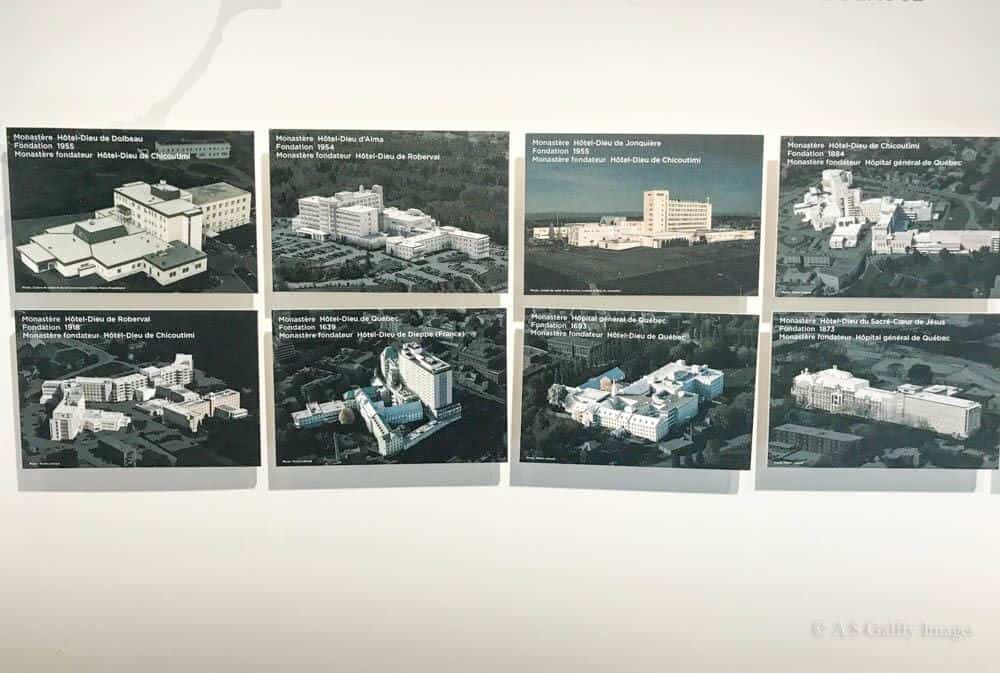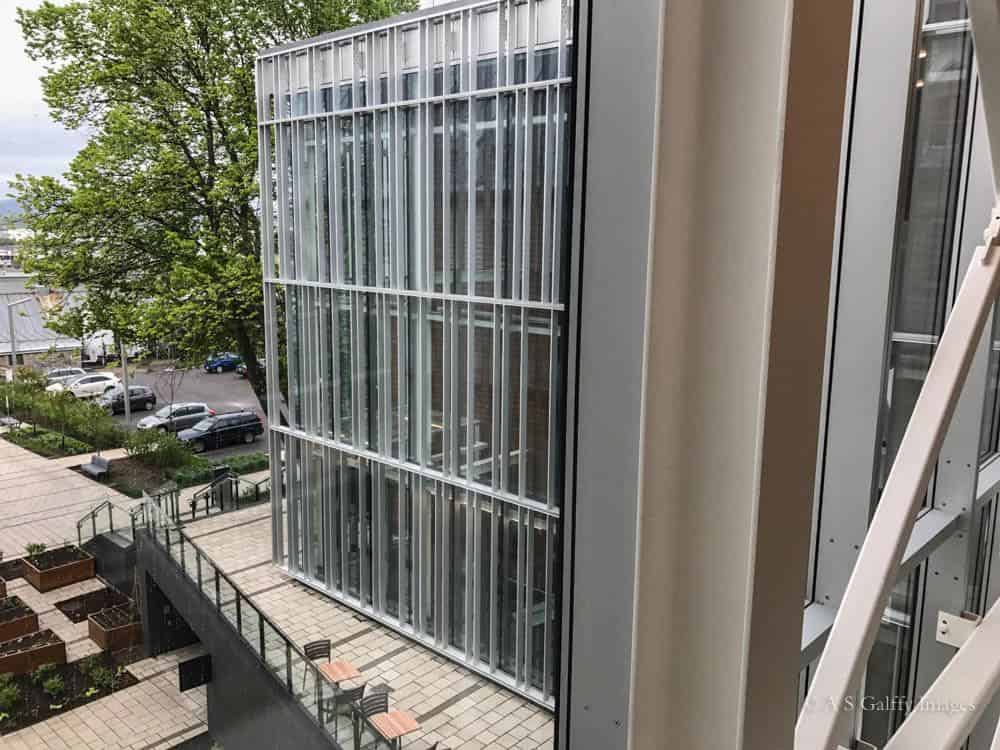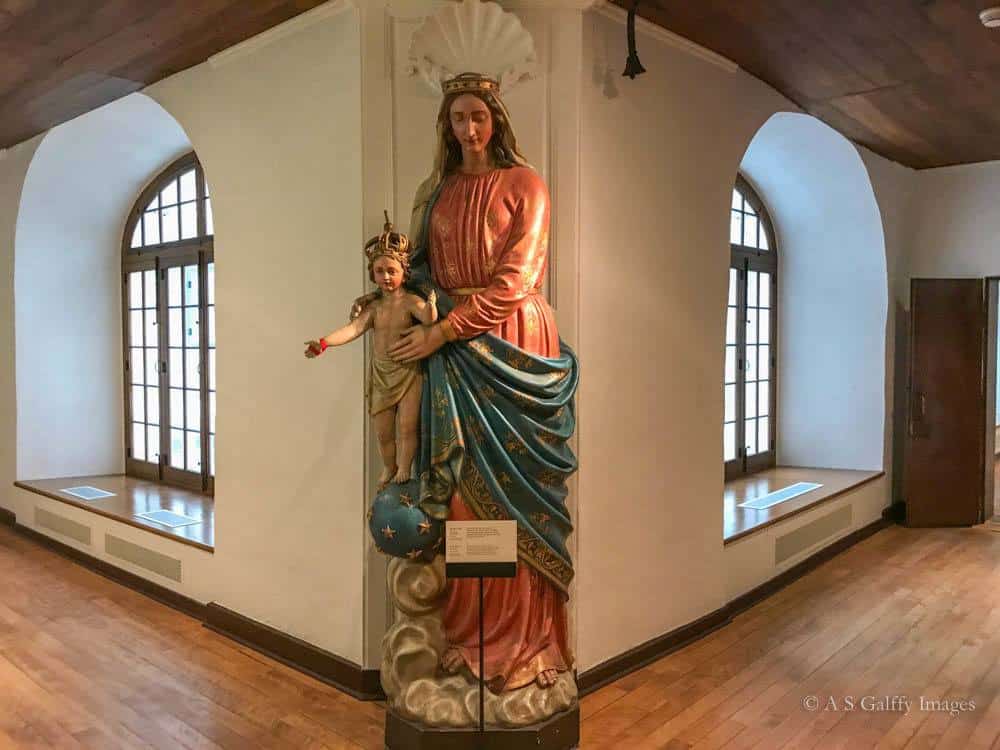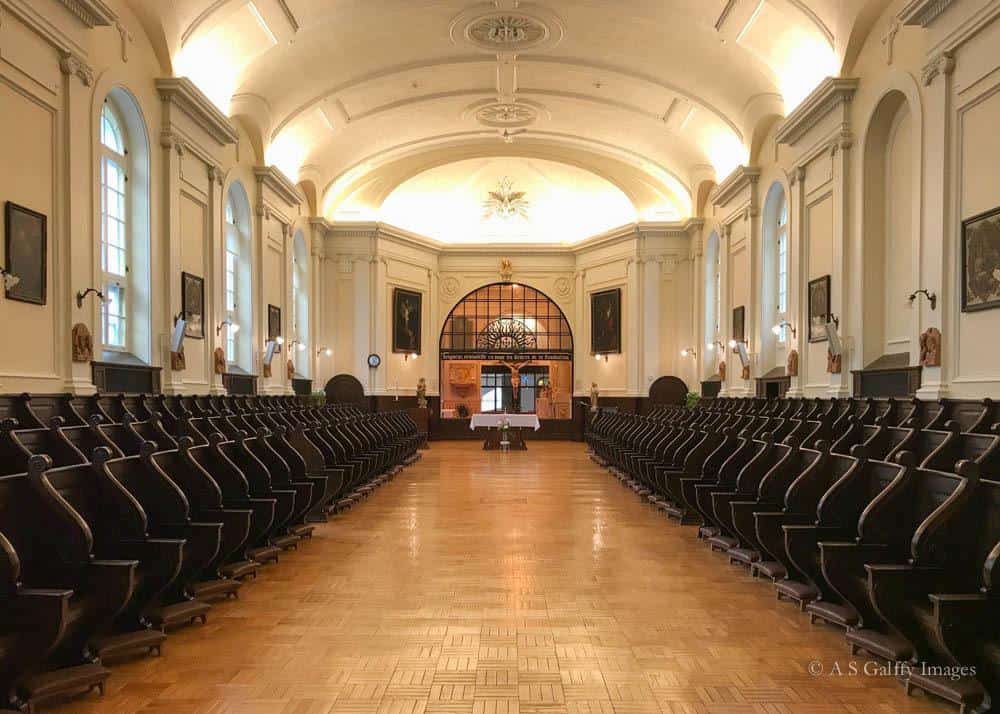I didn’t know what to expect when I checked into Quebec City’s Monastère des Augustines that afternoon. Are there going be nuns at the reception desk, or serving at the restaurant?
The modern glass structure that greeted me was not even vaguely reminiscent of a convent. And yet, the silence that flows with the light all across the sheer white walls of this edifice reminded me of a monastery. The noise of my suitcase dragged across the tiled floor was the only sound disturbing the peace that descended over this place some centuries ago.
Table of Contents
Checking into the Monastery des Augustines
“I am here for one night,” I tell the girl behind the desk who doesn’t seem to notice my presence right away. She looks preoccupied with a stack of papers that sits in front of her computer. “Ah, oui. Madame Galffy? We were expecting you.”
As I wait for my key I can’t help noticing her unassuming appearance: a simple gray dress, a pair of low heel shoes, no make up, no jewelry… Is she perhaps a nun? “We’ve put you in one of the contemporary rooms on the 4th floor,” she says. “However, this elevator will only take you to the 3rd floor and from there you’ll have continue on the corridor in front of you, then make a right…” “Can anybody show me to my room?” I ask, anticipating a labyrinth of intricate galleries. “Of course,” she says and hands the key over to one of her colleagues who starts leading me to the elevator.
A Hotel With a Rich History
In 1639, three Augustinian nuns came to Quebec City with a dispensation from King Louis XIII to care for the sick and wounded in New France. Their first hospital was established outside the colony of Québec, in what is today known as Sillery. However, after several attacks by the Iroquois, the sisters decided to move the hospital within the city walls for more protection.
In 1646 they opened Hôtel-Dieu monastery–hospital in Quebec City’s Upper Town, which they operated till 1962. The Augustinian Sisters not only took care of the sick at the hospital, but also took in abandoned children for whom they tried to find adopting families. They also welcomed and cared for immigrants upon their arrival at the port of Quebec City. Hôtel-Dieu is the oldest hospital established in North America, north of Mexico and is still in operation today.
Over the centuries, the nuns of the Augustinian Order founded a total of 12 monastery-hospitals throughout Quebec, where they acted as administrators, nurses and pharmacists. All the 12 hospitals are still active today, but only six of the monasteries retained their original function. The other six have been converted to serve other purposes.

The Monastère des Augustines Today
Out of the 800 members that the Order of the Augustinian Sisters once had, only around 100 nuns remain today. Ten of them still reside in an adjoining wing of Le Monastère des Augustines and attend Mass and Vespers every day in the Chapel.
In the 1980s, faced with an aging population and a steep decline in their numbers, the Augustine Sisters began evaluating new ways to use their building. They created a trust to preserve their rich heritage and in 2013 they took the initiative to start a hotel. Their idea was to combine accommodation services with a holistic retreat center that will give the guests a chance to relax and connect with their own emotions and senses.
The concept was new and very versatile. Because of its central location, the hotel was a good starting point to explore the city, while being a full-service retreat.
The hotel also has a social mission, by offering a special rate for people of Quebec who need to accompany their loved ones in the city’s hospitals. Le Monastère des Augustines Hotel is a non-profit organization. All profits go back into their social mission of providing care to those who need it—including their caregivers.
An Unconventional Hotel
We exit the elevator on the 3rd floor and continue over a connecting bridge toward the old building of the convent. I take one last look outside through the large window wall before following my guide into the dark passageway of the old abbey.
Not much has changed here since the time the nuns inhabited this part of the convent. Except for the shared bathrooms that have been completely renovated, this floor has been preserved its original form. Burnished wood doors with transom windows line up the austere corridor.
I could imagine a novice nun lowering her head to enter the loneliness of her cell in the evening. Dark ceiling beams and religious paintings garnish the white walls. Scattered throughout the hallway, there are original pieces of furniture and other artifacts that belonged to the Augustine Sisters.
The cells have been converted into 33 authentic single rooms, furnished with the same simple desks and small iron beds. The rooms retain the history and spiritual feel of the original cells, where the nuns used to live.
What to Expect at the Monastère des Augustines
As I follow my guide through the convent’s corridors I get a sense of inner calm and peace which I can’t quite explain. I’m trying to imagine what it must be like to live your life within the confines of a cloister. A life of solitude and isolation. A life dedicated to helping others. Life in a monastery couldn’t be more different from the stressful and dynamic world we live in. And yet, there are people who willingly choose it.
We now pass along a wider corridor with large bay windows and religious wood statues. The windows face an interior courtyard. “A former parking lot that was recently transformed into a garden,” my guide explains. Alcoves and private spaces are scattered throughout the building.
As we reach the forth-floor the ambiance changes completely. The corridors here have a more contemporary look. There is also a sitting area and a small business center. The 32 rooms at this level are more spacious and include ensuite bathrooms. Alhough very simply furnished, the bedding seems quite luxurious, with crisp bedsheets and handmade quilts or wool blankets on each bed. To encourage relaxation and tranquility, there are no televisions or telephones in the room, but free WiFi is available, so guests can use their electronic devices if they choose to.
Body and Mind
My next day starts with a morning practice that includes breathing, movement and meditation. These classes are included in several different rate packages. There are numerous other wellness options, ranging from sleep therapy and posture instruction, to holistic health evaluations, aromatherapy and reflexology.
To honor the traditions of the nuns, you are required to serve breakfast in silence. I play along with this intentional mood, but I find the silence kind of strange. Eating a full, healthy breakfast in the company of strangers give me time to reflect on my life. Such peaceful moments are rare for me. My usual breakfast is a cup of green tea savored in front of the computer.
The Legacy of the Monastère des Augustine
After breakfast I meet with Ms. Perron, the hotel manager, for a visit of the Monastère. We first go to the beautiful chapel on the second floor, which is still in use. The nuns come here for their morning prayers and vespers.
“Le Monastère welcomes people from all paths of life, no matter of their color, sexual orientation, religious beliefs, or denomination” Ms. Perron tells me.
We then move to the on-site museum where the nuns displayed their treasured artifacts. There is a collection of over 40,000 artifacts that occupy the entire first floor. There is centuries-old furniture, paintings, writings and ceramics to gifts from Native Americans. The Augustinian Sisters have preserved everything that was connected with their history.
Among these treasured artifacts there it’s the an important document. It’s the original letter signed by Louis XIII granting the sisters the rights of the land. The king also gave them the original 17th-century trunk brought here by three sisters when they came to New France.
As I stroll through rooms I am amazed to see old medical instruments, hospital beds, surgery tables and other rare and impressive objects and manuscripts.
The museum traces the evolution of medicine through the ages, but also gives you an insight into the lives of the Augustine nuns of Quebec. How they cared for the sick, how they lived their community life and their spiritual beliefs.
A Final Thought
Le Monastère des Augustines is more than just a hotel, it’s an experience. A time capsule that gives you a fascinating insight into the life and work of the Augustinian nuns and their legacy. It is a place to reflect and relax, a quiet and peaceful retreat right in the heart of the city. Staying here reminded me of the time before the World Wide Web, when people knew how to disconnect and live a simpler life.






 Strolling the Lungomare, Opatija’s Famous Promenade
Strolling the Lungomare, Opatija’s Famous Promenade



Michele {Malaysian Meanders}
Such an interesting and unique place to stay! I just sent this post to my friend as she’s in the midst of planning a trip to Quebec City. As a deeply religious Catholic, I think she’d particularly enjoy this monastery, although I’m glad that the place is open to everyone.
Anda Galffy
Le Monastery des Augustines is a very interesting place to visit even if you are not a Catholic. Thank you for sharing this post with your friend.
Vlad
Loved reading your post, Anda, it felt like I was there with you! Looks like a very peaceful place and that room you had is very cozy, I must put it on my Quebec list.
Anda Galffy
Quebec is about 8 hours away from you by plane, Vlad, so it’s not so difficult to reach. Hope you’ll get to see it soon.
Sally's Tips 4 Trips (aka Toddlers on Tour)
I love places like this. Wonderful to stay in a place that is so rich in history with interesting stories and so much to explore without even stepping out the doors.
Anda Galffy
This one was quite unusual, Sally, particularly because it was extremely comfortable and up-to-date, yet it maintained its original look in most of the areas.
Agness of Fit Travelling
Wow! The hotel seems outstanding! Your must have had an amazing experience, Anda!
Ruth | Tanama Tales
From the title of the post, I didn’t assume you stayed in a hotel. And then, what a hotel. The story of the nuns in Quebec reminds me a bit of the “padres” who founded the Missions in California (with a different purpose of course). Like you mentioned, it would be a nest experience to stay in a hotel where you can go on a hotel or a museum. I once did a tour of a hotel in Old Town San Diego (didn’t stay) and that was very interesting. #TheWeeklyPostcard
Mary {The World Is A Book}
What a beautiful experience to stay at this hotel. This is a beautiful hotel. I can see why you feel so at peace here. I’d love to visit if I ever make it to Quebec City. This was so interesting to follow your stay. We stayed at a monastery in Venice and it was quite memorable.
Anda Galffy
It was a very beautiful trip Victoria, but way too short. Three days in Quebec City are not enough…
Lydia C. Lee
We went to a 15th century hospital in Malta and it was amazing what medicine they could do – It sounds like an interesting place (love the pic with the flowers on the bed)
Anda Galffy
Oh, that must have been quite interesting, Lydia. I’d love to visit Malta.
Priscilla Willis
We need silence and reflection in our world more than ever. Truly a unique experience – the Augustine order has managed to bring their story into the modern world yet remain true to their life’s work and legacy. Thanks for sharing, Anda!
Anda Galffy
Thanks for reading my post, Priscilla. Ie was an interesting experience indeed which I would truly recommend if you happen to be in Quebec City.
Rhonda Albom
Your experience at this monastery turned hotel is fascinating. History, retreat, and a place to sleep rolled into one. In this age of fast-paced and hectic life, I think the nuns have reformed their life’s work into a great solution that serves and helps people.
Anda Galffy
It was an interesting experience indeed, and very inexpensive. I wish there were more places like this.
Donna Janke
Le Monastère des Augustines sounds like a very interesting and peaceful experience. A nice way to rest, rejuvenate and reflect in the midst of travel.
Anda Galffy
You should try it sometimes, Donna. Quebec City is not so far from you.
Debbra Dunning Brouillette
Fascinating post! I would enjoy seeing the museum devoted to medicine since I’ve covered healthcare for much of my writing career. You experienced something really different than most tourists to Quebec City. It certainly is an unconventional hotel, but, as you said, it is nice sometimes to disconnect and have a peaceful retreat.
Anda Galffy
Thank you, Debbie. Next time we should go together to Quebec.